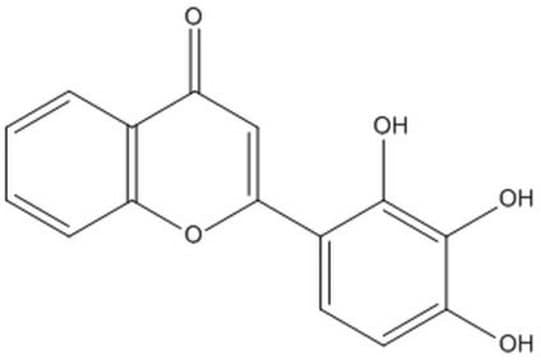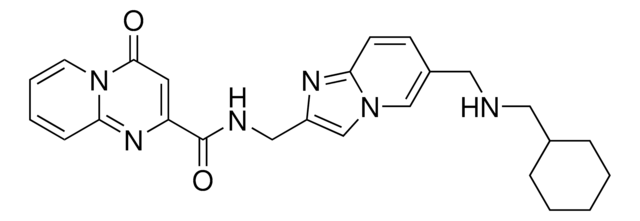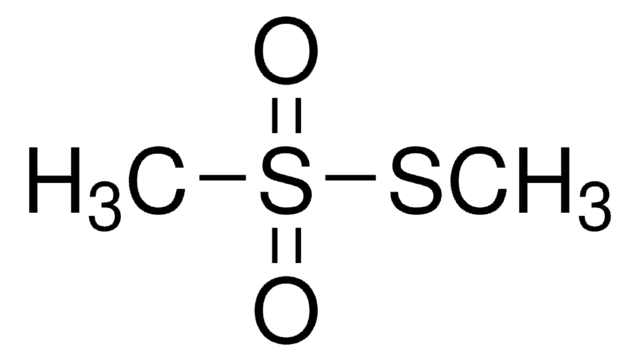SML1052
2-D08
≥98% (HPLC)
Synonym(s):
2′,3′,4′-trihydroxy-flavone, 2-(2,3,4-Trihydroxyphenyl)-4H-1-Benzopyran-4-one
Sign Into View Organizational & Contract Pricing
All Photos(1)
About This Item
Empirical Formula (Hill Notation):
C15H10O5
CAS Number:
Molecular Weight:
270.24
UNSPSC Code:
12352200
NACRES:
NA.77
Recommended Products
Quality Level
Assay
≥98% (HPLC)
form
powder
color
white to beige
solubility
DMSO: 20 mg/mL, clear
storage temp.
2-8°C
Application
2-D08 has been used as a small ubiquitin-like modifier (SUMO)ylation inhibitor.
Biochem/physiol Actions
2-D08 is a potent and cell-permeable inhibitor of sumoylation that block the transfer of SUMO (small ubiquitin-like modifier) from the E2 enzyme (Ubc9) thioester conjugate to the substrate.
Storage Class Code
11 - Combustible Solids
WGK
WGK 3
Flash Point(F)
Not applicable
Flash Point(C)
Not applicable
Certificates of Analysis (COA)
Search for Certificates of Analysis (COA) by entering the products Lot/Batch Number. Lot and Batch Numbers can be found on a product’s label following the words ‘Lot’ or ‘Batch’.
Already Own This Product?
Find documentation for the products that you have recently purchased in the Document Library.
MG132?induced progerin clearance is mediated by autophagy activation and splicing regulation.
Harhouri K, et al.
EMBO Molecular Medicine (2017)
RAS GTPases are modified by SUMOylation.
Choi B H, et al.
Oncotarget, 9(4), 4440-4440 (2018)
Pan Zhou et al.
Biochemical and biophysical research communications, 513(4), 1063-1069 (2019-04-24)
Acute myeloid leukemia (AML) is a heterogeneous clonal hematopoietic malignancy with poor survival and frequent relapse. Recently, a posttranslational modification of proteins with small ubiquitin-like modifiers (SUMO) has been notably implicated in a wide spectrum of diseases, especially cancers. Ubc9
Byeong Hyeok Choi et al.
Oncotarget, 9(4), 4440-4450 (2018-02-13)
RAS proteins are GTPases that participate in multiple signal cascades, regulating crucial cellular processes including cell survival, proliferation, differentiation, and autophagy. Mutations or deregulated activities of RAS are frequently the driving force for oncogenic transformation and tumorigenesis. Given the important
Karim Harhouri et al.
EMBO molecular medicine, 9(9), 1294-1313 (2017-07-05)
Hutchinson-Gilford progeria syndrome (HGPS) is a lethal premature and accelerated aging disease caused by a de novo point mutation in LMNA encoding A-type lamins. Progerin, a truncated and toxic prelamin A issued from aberrant splicing, accumulates in HGPS cells' nuclei
Our team of scientists has experience in all areas of research including Life Science, Material Science, Chemical Synthesis, Chromatography, Analytical and many others.
Contact Technical Service








